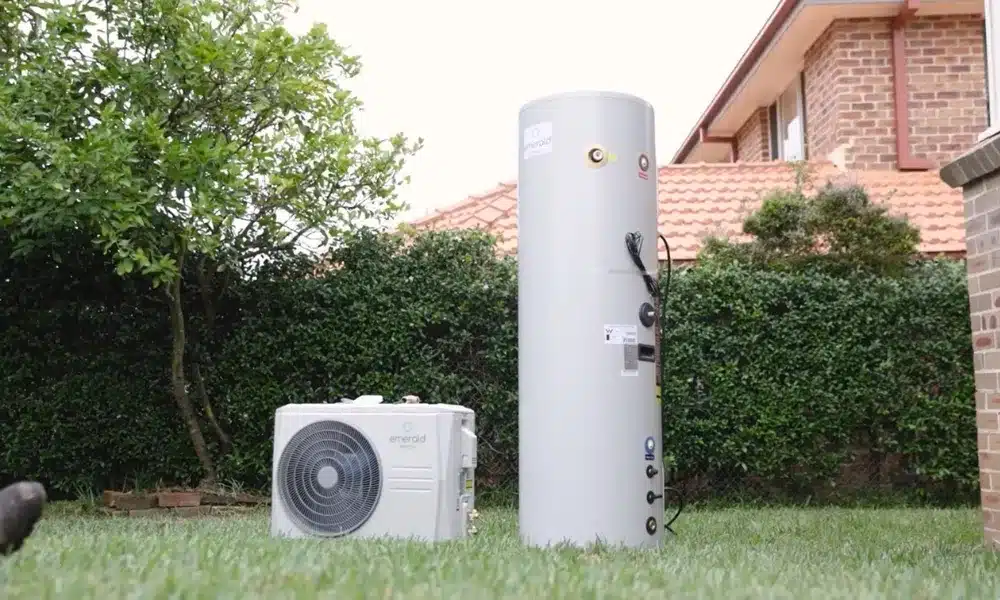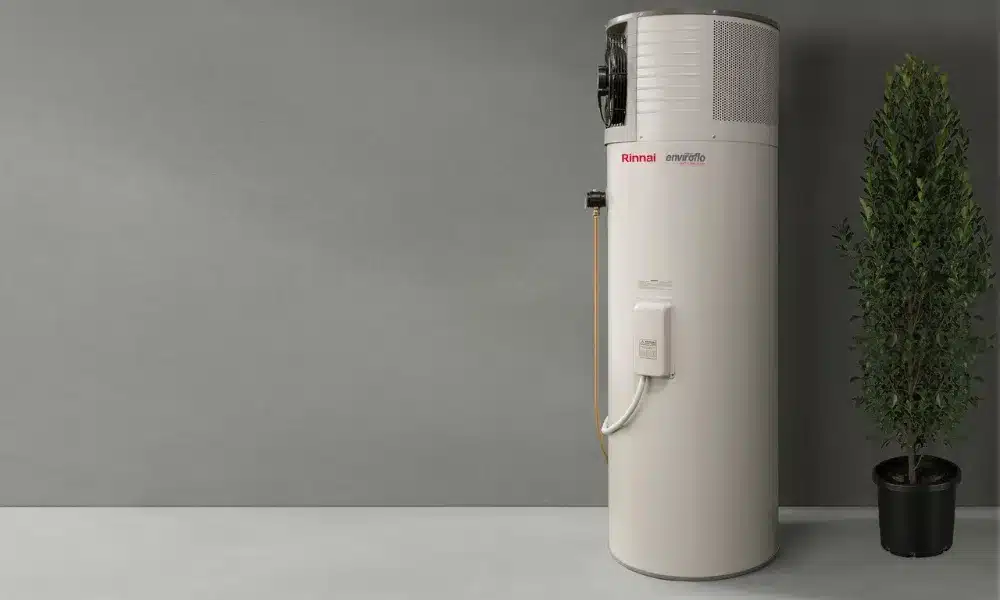You can install a heat pump hot water as an alternative to a traditional solar hot water system, such as solar hot water, solar panels, and a collector tank installed on a roof spring. A heat pump system can quickly provide a return on investment when properly designed and installed.
A heat pump is a different way to use renewable energy to heat water; they don’t need solar panels! Heat pumps can save you a bundle of cash on your hot water bills, as they use approximately one-third of the energy of an electric water heater.
On this page

What is a heat pump hot water system?
So, what is a heat pump hot water system? Since the sun is ultimately responsible for heating the air, a heat-pump hot water system can be viewed as a particular solar water heater. Unlike solar hot water systems, heat-pump systems lack an electric or gas-boosting system. However, they consume electricity when heating water to run the compressor and fan on the evaporator.
How does a heat pump hot water system work?
A heat pump is like a reverse fridge. It transfers the heat in the air outside the unit to the water stored inside the heater through a heat exchange system. In the case of heat pumps, “heat” is a relative term as they will still work in very cold conditions* – at least -10 degrees Celsius, so they will still generate hot water for you during winter nights. How is that possible?
Here’s how the hot water heat pump works:
- External air is drawn into the heat pump system via a fan into an evaporator containing a particular refrigerant stored in piping. The refrigerant used is called R134a, which isn’t a CFC, so it doesn’t negatively affect the Earth’s ozone layer.
- R134a has an evaporation or boiling point of -26 °C, whereas water has a boiling point of 100 °C. Temperatures that feel very cold are still more than enough to make the refrigerant “boil”. The air drawn into the system, which is far warmer than the refrigerant, turns the refrigerant from a liquid into a gas inside the heat pump’s piping.
- A compressor then pumps the now gaseous refrigerant through a small valve, compressing it and generating great heat.
- A heat exchanger transfers the heat from the heated refrigerant gas pipes to a tank where water is stored.
- The refrigerant temperature has dropped dramatically as the heat has been drawn away, so it returns to a liquid state, and the heat pump cycle begins again.
Benefits of heat pump hot water
- Massive savings in hot water-related expenses over the long term.
- A heat pump produces between 3 and 5 times more renewable energy than the electricity required to power the unit.
- It’s an environmentally friendly hot water option given the reduced greenhouse gas emissions through fewer energy requirements.
- A heat pump is effective even in low temperatures. An electric assist is activated in extreme cold to ensure the water stays at the desired temperature.
- No roof space or panels are needed.
- Ease of installation, as a solar heat pump uses the same connections as an electric hot water system.
Energy efficiency and environmental impact
Energy-efficient water heating systems
Heat pump water heaters are among the most energy-efficient water heating systems available. They can be three to four times more efficient than traditional electric water heaters, leading to substantial energy savings. For instance, they use approximately 30% of the energy consumed by conventional electric systems.
Environmental benefits
Heat pump systems lower greenhouse gas emissions by reducing electricity consumption. This aligns with Australia’s goals to decrease carbon footprints and promote sustainable living. Additionally, many models are compatible with solar power systems, enhancing their environmental friendliness.
Heat pump suitability
Installing heat pump hot water systems in locations with low average temperatures is not advisable. Although the units will work in cold weather, installation in cold climates will cause longer compressor runtimes, reducing the unit’s life expectancy and greater energy consumption.
Heat pump installation is not advisable in RECs zone 4 or Zone 3’s colder regions. Zones 1 and 2 are generally warm enough to enable the efficient operation of heat pumps. The yearly ambient temperature should equal or be greater than 19 degrees Celsius.
To determine your zone, check the Clean Energy Regulator, which maintains a list.

How much does a heat pump cost?
The price varies depending on your needs and location, but you can expect to pay between $2500 and $5500 for the unit. However bear in mind that other factors have a significant impact on this number, making it indefinite.
To understand how much a solar heat pump costs and what factors may affect heat pump cost, keep an eye on the following factors.
- You will always pay a little bit more for a higher capacity. You may select the ideal heat pump, whether big or small, based on the size of your family and your needs. Nonetheless, it has been shown that a 200L one will be adequate for a typical household of four if each person uses 50L of hot water per day.
- Solar heat pump installation cost. You must take into account the installation costs in addition to the price of the heat pump hot water system. Again, the answer cannot be found in a single step. The installation may charge you more for a larger system in a tougher house area. Similar to how labour costs may decrease along with installation costs for a lower-capacity heat pump with an easier installation process.
Suppose you replace your old demanding electric system with an efficient hot water solar heat pump; there are enormous government solar hot water rebates available in South Australia and Victoria.
Check out our page to learn about hot water system rebates.
Exploring your options for heat pump hot water
At Energy Matters, we offer a variety of heat pump hot water solutions to suit different household needs and budgets. Whether you’re looking for a compact unit for a small apartment or a high-capacity system for a large family, our solar expert team can help you find the perfect heat pump hot water service. We also provide information on integrating your heat pump hot water system with other renewable energy solutions.
Solar hot water systems
Are you considering a solar hot water service or solar hot water systems? Explore our dedicated page to learn how directly harnessing the sun’s energy can provide an even more sustainable hot water solution.
Hot water government rebates
Visit our rebates information page to discover the potential savings available through your area’s heat pump hot water government rebate programs.
Stainless steel vs. vitreous enamel (glass) hot water tanks
Ensure the longevity and efficiency of your hot water system by understanding the importance of quality hot water tanks; learn more about the options available on our dedicated tank page.
Choosing the right hot water heat pump
Choosing the right hot water heat pump is a significant decision. When selecting a hot water system heat pump, consider local climate, family size, and available space. Models vary by tank size, compressor type, and energy ratings. Many Australian households combine electric heat pump hot water systems with rooftop solar for greater efficiency.
- Household size: Larger households may require systems with greater capacity.
- Climate: Choose models suited to your local climate conditions.
- Budget: Consider both upfront costs and long-term savings.
- Energy sources: If you have solar panels, opt for systems compatible with solar integration.
Consulting with professionals can help determine the best system for your specific needs.
Contact Energy Matters today for solar expert advice and find the ideal solution for your hot water needs. Our team can help you get up to 3 FREE solar quotes from pre-qualified and vetted solar firms in your area.
Energy Matters has been recognised for our continued excellence in the Australian solar industry. We provide our customers with high-quality resources, insight, and access to reputable solar quotes.







































